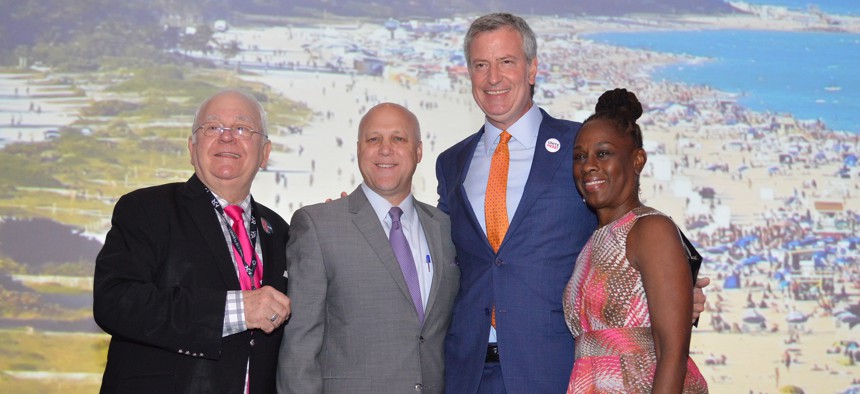How Local Leadership in America Has Changed Over the Years, From the Expert

From left, USCM Executive Director Tom Cochran, New Orleans Mayor Mitch Landrieu, New York City Mayor Bill de Blasio with his wife, Chirlane McCray. Courtesy U.S. Conference of Mayors

Connecting state and local government leaders
U.S. Conference of Mayors Executive Director Tom Cochran talks about the social movements and technological changes that have changed our mayors and our country.
MIAMI BEACH, Fla. — Tom Cochran, the CEO and executive director of the U.S. Conference of Mayors, has been serving the organization and its members for almost a half century.
“I’ve been here since ’69,” Cochran said in an interview with Route Fifty. “The keynote address was Spiro Agnew in Pittsburgh.”
As large city leaders’ voice in the nation’s capital since he became executive director in 1987, perhaps no one has a better understanding of how mayors (as well as their roles and personalities) have changed over the years—as well as what has stayed the same.
Diversity seems to be the change that stands out the most to Cochran. Many more black mayors and other people of color are leading the nation’s cities today. He also noted the number of mayors who publicly identify as LGBTQ.
While the U.S. Conference of Mayors, which gathered for its annual meeting in Miami Beach this weekend, is known for its public defense of key federal grant programs for cities, that’s not where Cochran believes the organization and its members have made the most impact.
“When the history of the Conference of Mayors is written, it probably won’t be about [Community Development Block Grants], it’ll be about the social movements in this country,” Cochran told me. “Our mayors changed civil rights, our mayors changed women’s rights, our mayors changed how we dealt with AIDS.”
Cochran reflected on how the social struggle continues on to this day.
When John F. Kennedy presented his five-point civil rights plan to the conference when he met with them in 1963, Cochran said the president had asked to talk with them about “race relations.”
“That’s still there,” Cochran said. He reflected on New Orleans Mayor Mitch Landrieu’s recent speech on the removal of Confederate monuments and the ongoing discussions on race in America.
Part of Landrieu’s agenda as incoming president of the U.S. Conference of Mayors is “increasing equity within our communities and ensure civil and human rights for all Americans.”
Technological Disruption, But Some Things Remain the Same
In his conversation with Route Fifty, Cochran noted how information technology and social media has been a driver of change in how his members approach the job and communicate.
Cochran reflected on the conference’s first e-governance discussion, remarking, “I think we had 80 websites in the country for cities and people were bragging how they could register their dog and get licenses and things like that. Well, now we’re governing with social media.”
Continuing the discussion about technology, Cochran shared stories of the angst that mayors of cities both large and small have about the role of automation changing the economy and eliminating jobs in their cities. He talked about mayors being at the forefront of the workforce disruption concern and attempting to find ways to cope with the fact that, in the words of one mayor, “robots are taking jobs.”
Cochran finds that today’s mayors are more “business oriented” than in the past, focused on how they can both support the business community, as well as leverage it.
Some things never change, though. When Cochran thinks about his members’ priorities, at least two issues have always been front and center: “One thing that never goes away is crime ... and traffic, traffic, traffic, traffic.” Public safety and transportation infrastructure once again played a central role at the 85th annual meeting.
The Current Political Environment
I asked Cochran if this is a different time politically for cities. He believes it is.
The Conference of Mayors has been actively engaged with the administration since they met with then-President-elect Trump at Trump Tower in December. The organization has been actively engaged with the administration on key issues ever since.
But it’s a very different environment, according to Cochran: “Trump has changed the political [landscape] for American cities, he’s changed it for America, and he’s changed how America is to the world.”
“Look, I worked with Nixon, I worked with Reagan, I worked with the Bushes, Clinton, and Carter—all of them,” said Cochran, explaining he's never seen anything like the current resident of 1600 Pennsylvania Avenue—or his methods. “When the president is tweeting, and when the president speaks, that’s policy,” Cochran said.
“We’re going to come back, we’re going to be fine. But to say that it’s not different? ... It is.”
Mitch Herckis is the Senior Director of Programs for Government Executive’s Route Fifty and is based in Washington, D.C.

NEXT STORY: ‘Ban the Box’ Movement Scores Win in America’s Most Incarcerated State





